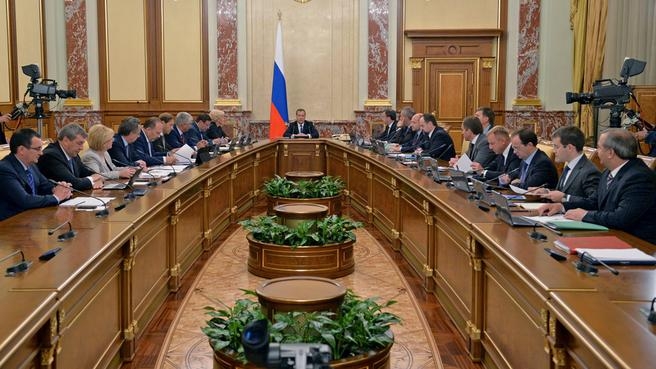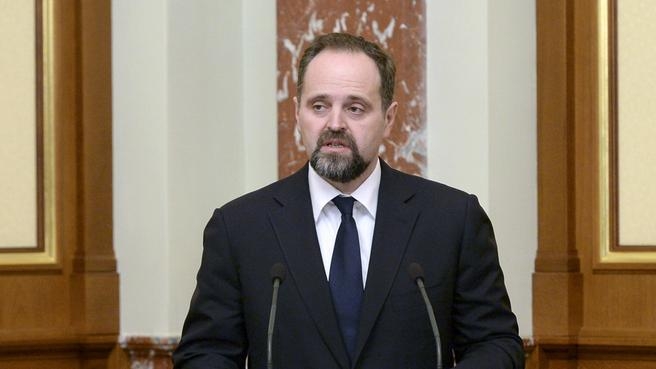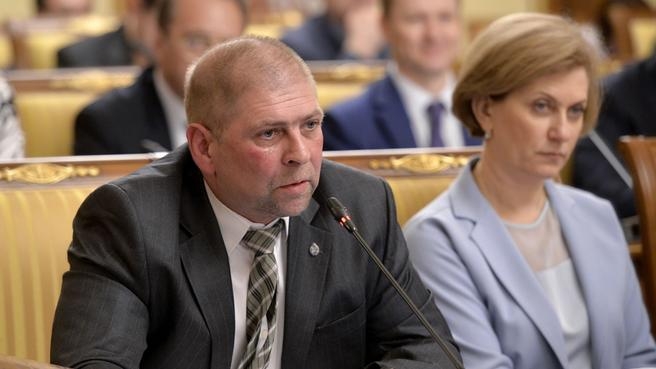Government meeting transcript excerpt.
Excerpts from Dmitry Medvedev’s introductory remarks
Report by Minister of Natural Resources and Environment Sergei Donskoy
Report by Director of WWF Russia Igor Chestin
<…>
Dmitry Medvedev: We have a number of specially protected nature territories where rare and endangered animals can feel safe. Special strategies to maintain their populations have been drafted and are being implemented. All rare animal species are listed in the Russian Red Data Book and in over 70 regional Red Data Books.
However, problems remain. The existing system of wildlife protection is not very effective. Another scourge is poaching, which also inflicts tremendous losses on rare animal populations.
Dmitry Medvedev: "Special strategies to maintain their populations have been drafted and are being implemented. All rare animal species are listed in the Russian Red Data Book and in over 70 regional Red Data Books."
The Government has adopted a number of measures stipulating tougher responsibility for the poaching and illegal sale of rare and endangered animal species, including criminal liability for smuggling particularly valuable animal and fish species listed in the Red Data Book. Efforts in this area must continue.
Sergei Donskoy (Minister of Natural Resources and Environment): The Government exercises special control over reserving and restoring the populations of rare and endangered species. Over 20 fundamental documents covering the protection of endangered species, including a long-term strategy for rare and endangered animal conservation, have been adopted in recent years. This strategy should lead to a significant increase in the population of rare species of mammals over the next 15 years, namely, by 40% for tigers, 70% for bison and 30% for leopards.
Animals that have dropped in number to a critical level can be found in almost every Russian region, but mostly in the Caucasus, southern Siberia and the Russian Far East. As a rule, animal populations drop due to the degradation of their habitat as a result of the massive economic development of particular territories. Global climate change also poses a risk, but a smaller one. However, animals that have traditionally been subjected to barbaric extermination are the first to end up on the endangered species list.
Sergei Donskoy: "The Government exercises special control over reserving and restoring the populations of rare and endangered species. Over 20 fundamental documents covering the protection of endangered species, including a long-term strategy for rare and endangered animal conservation, have been adopted in recent years."
According to experts, the habitat of some wild animal species shrank by 40% to 90%. The lack of effective mechanisms to counter poaching and the demand of a high-volume black market stimulate the large-scale illegal hunting of endangered animals. At the same time, the number of state inspectors and rangers decreased to one tenth over the past 10 years. According to conservative estimates, the annual damage from illegal hunting amounts to over 19 billion roubles.
The lack of an effective mechanism to offset damage caused to wildlife and their habitats in the implementation of major infrastructure projects is another factor to consider. Examples where such damage is offset can be counted on the fingers of one hand. The incentives to use compensatory mechanisms could markedly reduce environmental risks.
Expanding specially protected natural areas is important for preserving the habitats of rare species. The total area of federal protected areas increased by 6 million hectares over the past several years; another 24 federal protected areas with an area of 8 million hectares will be created over the next seven years. The law on protected areas will be amended this year to include additional measures to bolster the protection of natural areas in nature reserves and national parks.
Legislation, urban planning regulations and land codes must be amended as well with an eye towards improving the territorial planning system. In particular, this will make it possible to create an environmental corridor and protected habitats for rare animal species and form fishery conservation areas.
Sergei Donskoy: "The habitat of some wild animal species shrank by 40% to 90%. The lack of effective mechanisms to counter poaching and the demand of a high-volume black market stimulate the large-scale illegal hunting of endangered animals."
A continuous monitoring project involving satellite tracking, radio labelling, and photo and video recording is underway. Such an integrated approach that can be dubbed a “satellite-to-collar approach,” will make it possible to regularly and simultaneously monitor rare wildlife species in the range. Tracking the Amur tiger, which the ministry is doing in 2014-2015, is an important step towards this end.
The polar bear habitat cleaning and recovery project in the Russian Arctic protected area has been held since 2012, with 720 hectares cleaned to date.
In 2011-2013, the Academy of Sciences put together proposals on the expansion of the endangered species list in Russia. The primary goal this year is to publish an updated revision of The Animal World. In the future, the methodology for maintaining the list must be improved.
The proposal has been made to recreate the system for remunerating civilians who report the illegal hunting or trafficking of rare animals and their derivatives to the authorities. Additionally, as you may be aware, the President issued a directive to have at least three rangers per administrative area.
It is also important to have the capability for blocking access to websites that post ads regarding selling rare animals and their derivatives. It is likewise advisable to reduce the number of customs offices that clear the exports and imports of CITES-protected live animals and to create special pens for temporarily holding confiscated live animals.
Sergei Donskoy: "In 2011-2013, the Academy of Sciences put together proposals on the expansion of the endangered species list in Russia. The primary goal this year is to publish an updated revision of The Animal World. In the future, the methodology for maintaining the list must be improved."
Private initiatives are also bringing about good results. Thus, the Sakhalin Energy company is implementing a grey whale conservation programme in the Sea of Okhotsk, which boosted the number of these animals from 100 to 150.
In the future, it is important to expand the system for breeding rare wild animals in specialised nurseries. To further increase the Far Eastern leopard population (according to some researchers, the population grew by 50% in recent years), another nursery will be created in the Lazo Reserve, Sikhote-Alin.
The successful breeding of the Persian leopard in a special nursery in Sochi is a notable development. Already in April 2015, the first three leopards that grew up in the Sochi Centre will be released into the wild. Six cubs were born there over the past several years.
Creating gene banks for storing the genetic material of rare species, which will reduce risks in the face of shrinking natural habitats, is also important.
In recent years, environmental education has seen fundamental improvements. In many ways, this has become possible thanks to the personal involvement of the country’s leaders in environmental activities. However, there are lots of unresolved problems in the sphere of science and education. In particular, it is necessary to engage more young researchers in environmental studies. Environmental advocacy must have a bigger presence on federal TV channels. I believe that it is necessary to create a children's television channel concerning animals and their protection.
Celebrating the 100th anniversary of nature conservation in Russia in 2016 will be an important event for environmentalists. With this important anniversary in mind, and remaining fully aware of the immense importance of the protected areas system, the ministry suggests making 2016 the Year of Specially Protected Natural Areas.
Sergei Donskoy: "The 2010 Tiger Conservation Forum was a landmark event. Russia's expertise in holding tiger summits is still widely used worldwide."
International cooperation is vital for preserving biodiversity. The 2010 Tiger Conservation Forum was a landmark event. Russia's expertise in holding tiger summits is still widely used worldwide. In December 2013, the ministry held an international conference on polar bear conservation. In conjunction with our foreign colleagues, a major project for big cat conservation is now underway.
In order to accentuate Russia’s status as a leader in biological diversity conservation, the ministry put forward a proposal to hold the 2020 World Congress of the International Union for Conservation of Nature in Russia followed by the Seventh World Congress on Protected Areas.
Igor Chestin (Director of WWF Russia): Thanks to personal attention of the country's leaders, we managed to accomplish a great deal in rare species conservation in recent years. Considerable funds have been raised, mostly from nongovernmental sources via the Russian Geographical Society. We have created two funds: one for the Amur tiger and one for the Far Eastern leopard.
The list of endangered species was last updated in 2001, which is bad news.
In part, this is due to the fact that the Commission on Rare Species at the Ministry of Natural Resources and Environment has for many years been inactive, and its membership has remained unchanged since then as well.
Igor Chestin: "Considerable funds have been raised, mostly from nongovernmental sources via the Russian Geographical Society. We have created two funds: one for the Amur tiger and one for the Far Eastern leopard."
A new threat – the introduction of invasive alien species – emerged over the past several years, especially this year. In particular, 224 white-tailed deer were imported from the United States and brought to the Voronezh Region despite the negative conclusions by researchers and specialists who found that this species is extremely dangerous for other ungulates. Over 100 American bisons have been imported in the Smolensk Region, which jeopardises the European Bison Recovery Programme. This unregulated import of invasive alien species needs to be addressed at the legislative level.
With regard to illegal trade, an important law was passed last year that establishes severe punishments for illegally trafficking wild animals and plants. Still, customs offices still have to proceed without special pens. The problem needs to be addressed as well.
Dmitry Medvedev: Such a commission should convene, and I hope that it will convene on a regular basis in the future.
Regarding unauthorised wildlife imports in Russia, if an animal is imported for purposes other than for a zoo, such as, for instance, to be released into the wild, then, of course, the consequences should be considered. It might make sense to establish such a legal procedure and, if necessary, to amend special wildlife protection regulations.
<…>














